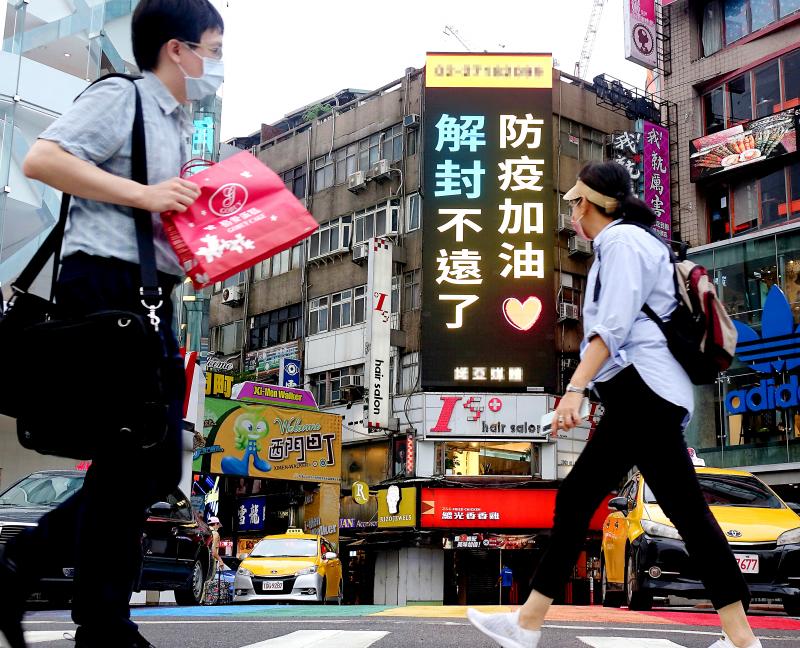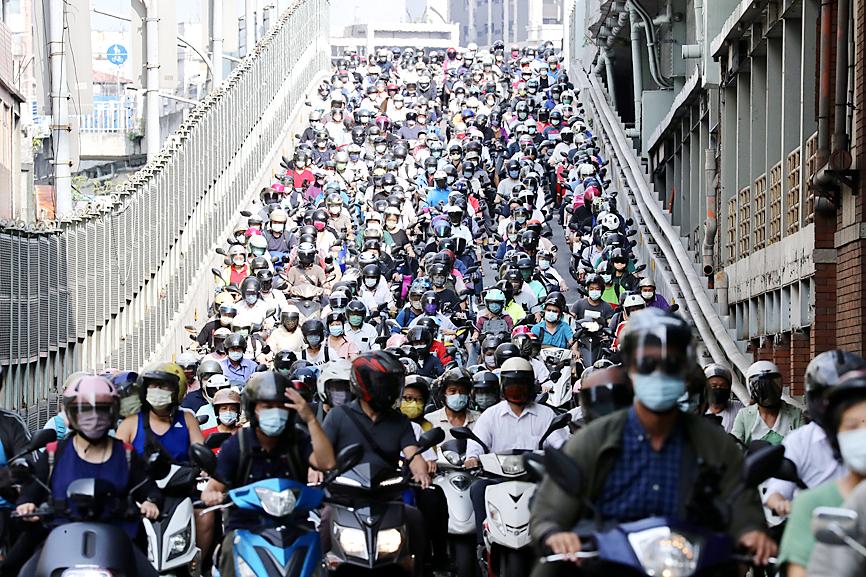Taiwan Semiconductor Manufacturing Co (TSMC, 台積電) and the Hon Hai Precision Industry Co (鴻海精密)-affiliated Yonglin Foundation yesterday said they would each donate 5 million COVID-19 vaccine doses to the government.
The companies announced the donations in two separate postings on the Taiwan Stock Exchange, where their shares are traded.
The announcements came after Shanghai Fosun Pharmaceutical Group Co (上海復星醫藥集團), which distributes the Pfizer-BioNTech COVID-19 vaccine in Taiwan, China, Hong Kong and Macau, said a day earlier that it had signed deals with the companies.

Photo: Chu Pei-hsiung, Taipei Times
The government late last month authorized the two tech companies to purchase up to 10 million doses of the BioNTech vaccine. The government had previously refused to buy the vaccine from the Shanghai-based distributor, citing worries that the doses might be made in China and not be safe.
TSMC and Hon Hai yesterday said that the doses they are buying would be shipped directly from the manufacturer in Germany.
The doses could arrive as early as the end of September, they said in a joint statement.

Photo: CNA
Hon Hai founder Terry Gou (郭台銘) said on Facebook that he would continue to push the manufacturer to deliver the doses as soon as possible.
Hon Hai in a statement said that it would spend up to US$105 million and the foundation would spend up to US$70 million on the vaccine deal.
TSMC, the world’s largest contract chipmaker, in a separate statement said it would spend up to US$175 million, which would include cold chain management for storage, insurance and other services.
The companies said they would donate the doses to the Centers for Disease Control.
TSMC said the donation is meant for emergency relief and would be ratified by its board.
Executive Yuan spokesman Lo Ping-cheng (羅秉成) thanked the companies for their efforts in obtaining vaccines for Taiwan.
It was through hard work and cooperation between the government and the private sector that progress could be made in such a short time, Lo told a news briefing.
The government plans to purchase more Moderna vaccines this year, he said, but did not provide an exact number, saying only that it plans to buy at least 15 million doses of the US company’s “second-generation vaccine” against COVID-19 in the next two years.
Minister of Health and Welfare Chen Shih-chung (陳時中), who heads the Central Epidemic Command Center (CECC), yesterday said that TSMC and Hon Hai have not mentioned reserving doses for their employees.
As the AstraZeneca and Moderna vaccines are not recommended for people aged 12 to 18, the CECC might consider reserving some of the BioNTech doses for young students, he added.
About 3.28 million people in Taiwan, or more than 14 percent of the population, have received at least one COVID-19 shot, while 72,321 people, or 0.3 percent, have been fully vaccinated.
Taiwan has signed contracts to buy about 20 million doses of COVID-19 vaccines from abroad: 5.05 million doses of Moderna, 10 million doses of AstraZeneca and 4.76 million doses of unspecified brands through the COVAX program.
As of yesterday, only about 2.15 million doses have been delivered, but Taiwan has also received donations of 4.86 million doses from the US and Japan.
The government has also signed contracts to buy 10 million doses of vaccines from two domestic manufacturers, but their vaccines have not yet received emergency use authorization from the Food and Drug Administration.
Additional reporting by Lee I-chia

OPTIMISTIC: The DGBAS sharply upgraded its GDP growth estimate from 3.54 percent to 7.71 percent after the Taiwan-US trade agreement signing and given AI optimism The US imported more from Taiwan than China for the first time in decades, as US President Donald Trump’s tariffs reshape trade flows while a global boom in artificial intelligence (AI) fuels demand for tech products. US purchases of goods from China plunged almost 44 percent in December last year from 2024 to US$21.1 billion, US Department of Commerce data showed on Thursday. By contrast, shipments from Taiwan more than doubled during the same period to US$24.7 billion. The soaring Taiwanese shipments to the US reflect the huge expansion in supplies of chips and servers for AI companies, which has completely changed

NON-NEGOTIABLE: The US president’s action ran counter to one of the US’ ‘six assurances’ on not consulting China about arms sales to Taiwan, US lawmakers said US President Donald Trump’s admission that he is discussing arms sales to Taiwan with Chinese President Xi Jinping (習近平) is “alarming and a blatant violation of US policy and the six assurances,” US Representative Ro Khanna said on Tuesday. Trump on Monday said he would decide soon on whether to send more weapons to Taiwan, after Xi warned him not to do so. “I’m talking to him about it. We had a good conversation, and we’ll make a determination pretty soon,” Trump told reporters aboard Air Force One when asked about warnings raised by Beijing during a phone call with Xi over

The Central Election Commission has amended election and recall regulations to require elected office candidates to provide proof that they have no Chinese citizenship, a Cabinet report said. The commission on Oct. 29 last year revised the Measures for the Permission of Family-based Residence, Long-term Residence and Settlement of People from the Mainland Area in the Taiwan Area (大陸地區人民在台灣地區依親居留長期居留或定居許可辦法), the Executive Yuan said in a report it submitted to the legislature for review. The revision requires Chinese citizens applying for permanent residency to submit notarial documents showing that they have lost their Chinese household record and have renounced — or have never

US and Chinese fighter jets briefly faced off above waters near the Korean Peninsula this week, Yonhap News agency reported, marking a rare confrontation in that area between the two superpowers. About 10 US fighter jets on Wednesday departed an airbase in Pyeongtaek, South Korea, for drills above international waters off South Korea’s western coast, the news outlet cited unidentified military sources as saying. While the US planes did not enter China’s air defense identification zone, Beijing scrambled planes as they neared that region, the report said. “The Chinese People’s Liberation Army organized naval and air forces to monitor and effectively respond